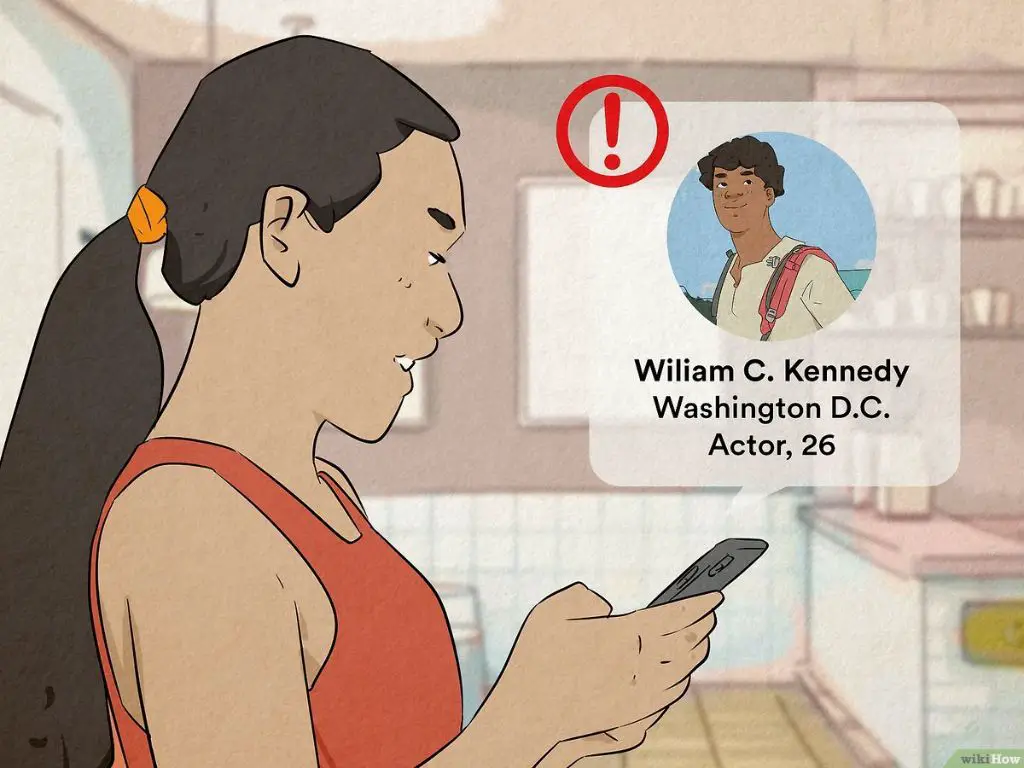What is Catfishing?
Catfishing refers to the creation of a fictitious online persona or fake identity, typically on social networking platforms, according to Wikipedia. It often involves using someone else’s photos and fabricated personal information to deceive unsuspecting victims. The term catfishing was inspired by fishermen who used catfish bait to catch bigger fish. Similarly, online catfish use fake personas as bait to lure victims into romantic or financial scams.

The motivations behind catfishing include:
- Romance scams – Catfish create fake online dating profiles and form relationships under false pretenses to manipulate victims out of money.
- Revenge or bullying – Some catfish assume fake identities to harass or humiliate victims out of spite or jealousy.
- Experimentation – Bored or curious individuals may catfish just to see if they can convince someone they are a different person.
- Ego-boosting – Constructing an elaborate fake persona allows catfish to attract affection or praise that may be lacking in real life.
- Escape – Catfishing provides an avenue of escapism for people seeking to leave behind or hide aspects of their real identity.
Catfishing involves extensive deception and manipulation, often with damaging emotional or financial consequences for victims. It demonstrates a concerning disconnect between online and real-world identities.
Is Catfishing Illegal?
There are no specific laws against catfishing itself at the federal level. However, certain catfishing behaviors could fall under other laws related to fraud, identity theft, or harassment depending on the circumstances.
For example, if someone uses a fake identity to trick a victim into sending money or sharing financial information, they could potentially face wire fraud or identity theft charges. According to the Federal Trade Commission, romance scams that involve using a fake online identity to manipulate victims into sending money are considered a form of wire fraud.
Some states like California and New York have laws against impersonation, which could apply if someone is using a fake identity to harm or deceive someone else. Additionally, catfishing behaviors that involve repeated, unwanted contact or threats could potentially fall under stalking or harassment laws.
However, catfishing itself does not automatically equate to a crime in most cases. The catfisher’s specific actions and intentions, and whether they illegally obtained money or damaged others, would determine if an actual law was broken that could lead to criminal charges or a civil lawsuit.
Financial Catfishing
Financial catfishing refers to scamming someone out of money by pretending to be someone else online. While not inherently illegal, financial catfishing often involves fraud, which is against the law. According to a Morning Consult poll, victims’ reported financial losses from romance scams topped over $600 million in 2020, a 26% increase from the previous year (source). The FTC received over 25,000 complaints of imposter scams in 2020 resulting in $304 million lost (source).

A common financial catfishing technique is romance fraud, where a scammer creates a fake online dating profile to form a relationship and eventually ask for money. Once trust is gained, the scammer may ask for funds to pay for an emergency, investment opportunity, or travel costs to finally meet in person. According to the FBI, romance scams account for the highest financial losses of all internet-facilitated crimes (source). Victims in the US and Canada lost nearly $1 billion to romance scams in 2021 (source).
Romance Fraud
Romance scams, also known as confidence fraud, involve using fake online identities to take advantage of people looking for companionship or romance. Scammers use dating websites, apps, and social media to connect with potential victims and build trust over weeks or months. Once a rapport is established, the scammer will ask for money under false pretenses – for an emergency, investment opportunity, travel costs to finally meet, etc.
According to the Federal Trade Commission, romance scams generated some of the highest reported losses of any type of fraud in 2022. Nearly $1.3 billion was lost to romance scams, with a median reported individual loss of $4,400 (FTC). The most common lies reported by victims were scammers needing funds for a medical emergency or trip to finally meet in person.
The psychological manipulation involved in romance scams causes deep emotional trauma and financial devastation. These scammers prey on vulnerable people seeking love and attachment. Their tactics are despicable and their actions illegal in most jurisdictions.
Fraud Laws
There are several federal laws that can apply to catfishing scams, especially when they involve using mail, phones, or the internet to deceive victims:

- Mail fraud – It is illegal under 18 U.S. Code § 1341 to use the postal service to further a fraudulent scheme.
- Wire fraud – Under 18 U.S. Code § 1343, it is illegal to use telecommunications like phones, radio, or television to commit fraud.
- Computer fraud – The Computer Fraud and Abuse Act makes it illegal to access a computer without authorization or to use a computer to commit fraud.
Prosecutors can apply these charges in catfishing cases when a scammer uses technology and deception to obtain money or other benefits from victims. For example, in romance frauds, catfishers may use texts, emails, instant messages, or dating sites to create fake relationships and scam their victims. They can be charged for these fraudulent activities under federal fraud laws.
Successfully prosecuting catfishing under fraud laws requires showing the defendant had intent to defraud and their actions were willful. Evidence like financial records, communications, and witness testimony can help prove these elements in court.
FTC on Imposter Scams
The Federal Trade Commission (FTC) provides guidance for consumers to avoid falling victim to imposter scams. According to the FTC’s website, “Scammers are using the Federal Trade Commission’s good name to try to trick people into paying them — or sharing personal information” (https://www.ftc.gov/office-inspector-general/ftc-imposter-scams).
Some red flags to watch out for are threats of arrest or legal action for not paying a supposed debt to a government agency. The FTC warns to not provide any personal information or payment over the phone, and that government agencies do not act in this manner. Legitimate FTC investigators also do not call citizens asking for money or personal details.
To avoid imposter scams, the FTC advises being suspicious of any call claiming you owe money to the government. Do not provide payment or personal information to the caller. Instead, hang up and report the incident to the FTC’s Complaint Assistant at https://www.ftc.gov/faq/consumer-protection/submit-consumer-complaint-ftc. Also note the caller’s information and report to agencies like the IRS or Social Security Administration if claiming to be from those agencies. Remaining vigilant against suspected fraud is key to preventing loss from an imposter scam.
Case Studies
Some high-profile examples of catfishing for money include:
The case of a 56-year old Texas man who allegedly used fake online personas to manipulate numerous women into sending him over $800,000 over a 7 year period. He reportedly catfished the women by claiming he needed money for a variety of reasons such as business investments, medical expenses, and travel costs. Many of the women ended up losing tens of thousands of dollars each.
A catfishing romance scam in Virginia where a woman believed she was in an online relationship with a US soldier but ended up losing $286,000 after being manipulated into sending money overseas. This type of military romance scam is a common technique used by catfishers targeting vulnerable people looking for love and connections.
The case of the “Tinder Swindler” who used fake online personas on dating apps to scam various women out of an estimated $10 million by convincing them he was a wealthy businessman in need of loans. The story received global media attention as an egregious and elaborate example of romantic catfishing for financial gain.
Avoiding Catfishing Scams
Being aware of potential red flags is key to avoiding catfishing scams. Here are some tips for spotting catfishers:

- Asking lots of personal questions but remaining vague about their own details. Catfishers may seem very interested in you, but share little about themselves (Malwarebytes).
- Inconsistencies in their story or facts about their life. Their details may change or contradict each other over time as it’s hard to keep fake stories straight (PCMag).
- Refusing or making excuses to video chat. Catfishers often avoid live video since it will reveal they aren’t who they claim to be.
- Moving the relationship too quickly and professing love very fast. This is aimed to hook victims emotionally before they detect the scam (Seersco).
You should also be wary about providing personal financial information or sending money to someone you’ve only interacted with online. Common tactics are asking for loans, gift cards, bank account access, or cryptocurrency payments.
Do reverse image searches on profile pictures to see if they are stolen from somewhere else online. You can also look up phone numbers or emails on sites like SpyDialer to see if they are connected to a real identity.
Trust your instincts – if something seems suspicious about an online relationship, stop communicating with them.
Reporting Catfishing

If you suspect you are being catfished, it’s important to contact the proper authorities to report the incident. Many victims of catfishing lose significant amounts of money, so reporting quickly is crucial.
To file a police report for a suspected catfish, contact your local police department’s fraud division. Provide as much evidence as possible, including the catfish’s profile information, messages, photos exchanged, and any money or gifts you may have provided. The police can investigate further and potentially file charges if laws were broken.
You can also report suspicious accounts or activity directly to the social media platforms and dating apps where the catfishing occurred. Services like Facebook, Instagram and Tinder all have options to report fake accounts. Provide specifics on why you believe the account is fake. The platform can then investigate and potentially delete the account if it violates their policies.
Additional online tools like Social Catfish (https://socialcatfish.com/scamfish/what-to-do-if-youre-being-catfished-a-step-by-step-guide/) and the IC3 complaint form (https://www.ic3.gov/complaint) allow you to submit details about your specific catfishing case. They will document the incident in case it’s part of a larger pattern of fraud requiring legal action.
Acting quickly to report catfishing can help investigators locate the perpetrator and potentially stop the scam from harming more victims. Don’t hesitate to utilize the many resources available to expose catfishing and fraud.
The Ethical Debate
There is an ongoing debate around the ethics of catfishing and using fake identities. Some view catfishing as clearly unethical, arguing it involves deception in relationships that are supposed to be based on honesty and trust (Mckayla White, 2022). They say it can deeply hurt and betray people once the truth is revealed. However, others argue there are some acceptable uses of false identities, viewing it as a harmless form of escapism or an acceptable way to develop casual connections online (Thacon, 2021).
Those against catfishing say it violates principles of honesty, authenticity and informed consent in relationships. They argue people have a right to know who they are really interacting with online. Catfishing erodes trust in online spaces by promoting deception and manipulation. It can enable scams, abuse and other predatory behavior behind a mask of false identity. Overall, most ethicists agree any close, romantic relationship built entirely on lies is unethical in principle (Media Engagement, 2018).
However, some defend mild forms of identity play and pseudonymity online. They say white lies and harmless roleplaying can allow introverted people to open up and form connections they otherwise may not. As long as it does not enable fraud or abuse, some view it as permissible within reason. But there is still debate around where to draw the ethical line when using false personas online.

